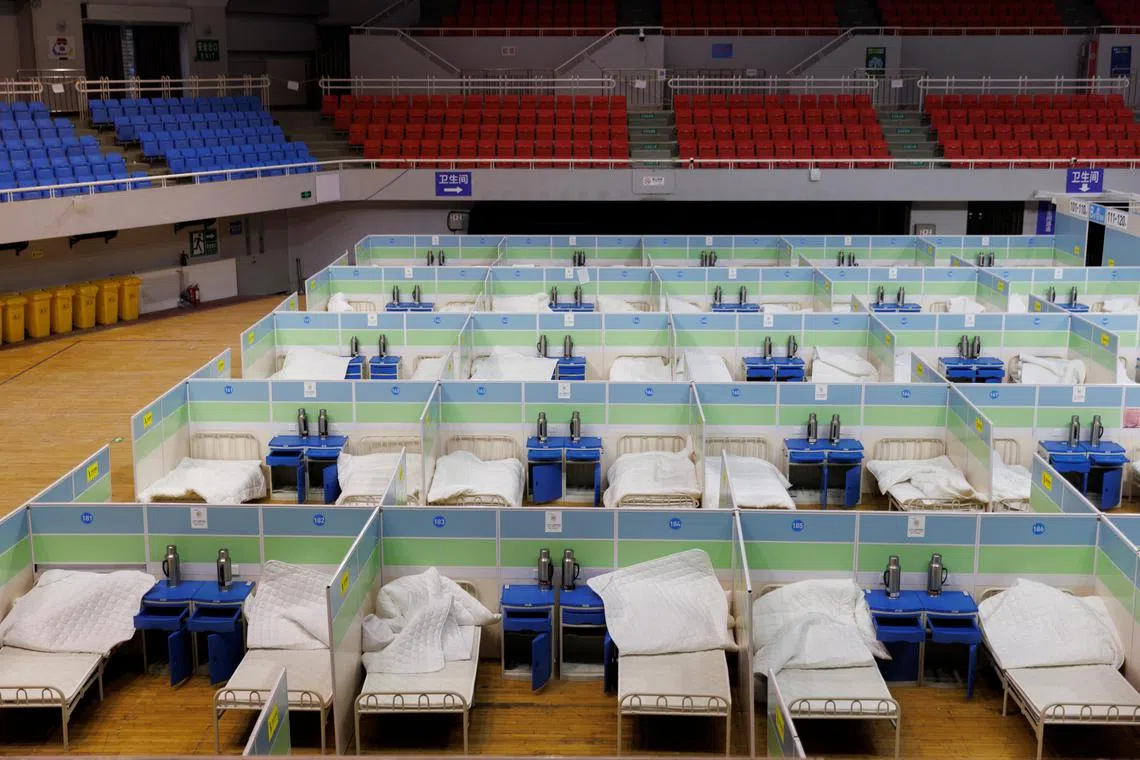The world fears a new China Covid-19 wave, ponders how to help Xi Jinping
Sign up now: Get insights on Asia's fast-moving developments

Beds set up at a fever clinic in a sports hall, amid the Covid-19 outbreaks, in Beijing on Dec 20, 2022.
PHOTO: REUTERS
Follow topic:
WASHINGTON – Officials and global health experts are anxiously watching a Covid-19 surge in China, worried a nation of 1.4 billion people is inadequately vaccinated and may not have the healthcare tools to treat a wave of illness expected to kill more than a million people through 2023.
Some US and European officials are struggling to figure out how, or if, they can help mitigate a crisis they fear will hurt the global economy, further constrain corporate supply chains and spawn new coronavirus variants of concern.
“We have made that point that we are prepared to help in any way they might find acceptable,” US National Security Council spokesman John Kirby said on Wednesday.
Advance preparation of the healthcare system, accurate and shared data collection, and open communication are all important to battling mass coronavirus infections, say health experts from countries outside China who struggled through their own Covid-19 waves. Many of those elements appear to be lacking in China, they say.
President Xi Jinping has long insisted that China’s one party-system is best suited to handle the disease, and that Chinese vaccines are superior to western counterparts, despite some evidence to the contrary.
Democratic governments find themselves in a difficult spot diplomatically, wanting to help stem a burgeoning crisis with global and domestic health and economic implications in a way that the Chinese government might be willing to accept.
“China’s vaccine nationalism is deeply tied to Xi’s pride… Accepting Western assistance would not only embarrass Xi, it would also pierce his oft-propagandised narrative that China’s governance model is superior,” said Mr Craig Singleton, deputy director of the China programme at the Foundation for Defence of Democracies.
European and US officials are conducting careful behind-the scenes talks with their Chinese counterparts, while issuing deliberately worded public statements intended to make clear that the ball is in Beijing’s court.
To ask or not to ask
One area of potential Western assistance involves whether China would accept BioNTech’s updated mRNA vaccine
German Chancellor Olaf Scholz discussed the issue in a visit to Beijing in November, along with BioNTech chief executive Ugur Sahin.
But the United States and other Western countries are not openly encouraging China to accept Western-made mRNA vaccines, White House coronavirus response coordinator Ashish Jha told reporters on Thursday.
“We stand ready to help any country in the world with vaccines, treatments, anything else that we can be helpful with,” he said.
Beijing has said “institutional advantages” will help it get through the epidemic without foreign assistance, and China’s estimated Covid-19 death toll is still lower than the 1.1 million US deaths and Europe’s 2.1 million.
But US drugmaker Pfizer last week reached an agreement to export its Covid-19 antiviral treatment Paxlovid to China
“Whether China asks or not, as a citizen of Beijing, I welcome the attitude of the US government,” Mr Hu Xijin, former editor of party tabloid the Global Times, said on Twitter, adding that he hopes the US government will push Pfizer to lower Paxlovid’s price.
‘Risky situation’
“We want China to get Covid right,” US Secretary of State Antony Blinken said earlier in December. “It’s in the interests of the Chinese people first and foremost, but it’s also in the interests of people around the world.”
US Federal Reserve Chair Jerome Powell signalled his worries last week.
“China faces a very challenging system in reopening,” he said, adding that its manufacturing, exporting and supply chain remain critical. “It’s a risky situation.”
Health experts outside China despair that it may be too late to stave off a tragedy.
“What do you do for a Category 5 hurricane when it’s an hour and a half offshore? If you haven’t done it by now, it’s too late,” said Mr Michael Osterholm, director of the Centre for Infectious Disease Research and Policy at the University of Minnesota.
“This pandemic is just going to blow through (China) in the next weeks,” he said. “It’s unfortunate they didn’t think about this six or 10 months ago. They could have bought themselves time to be in a better position.” REUTERS

